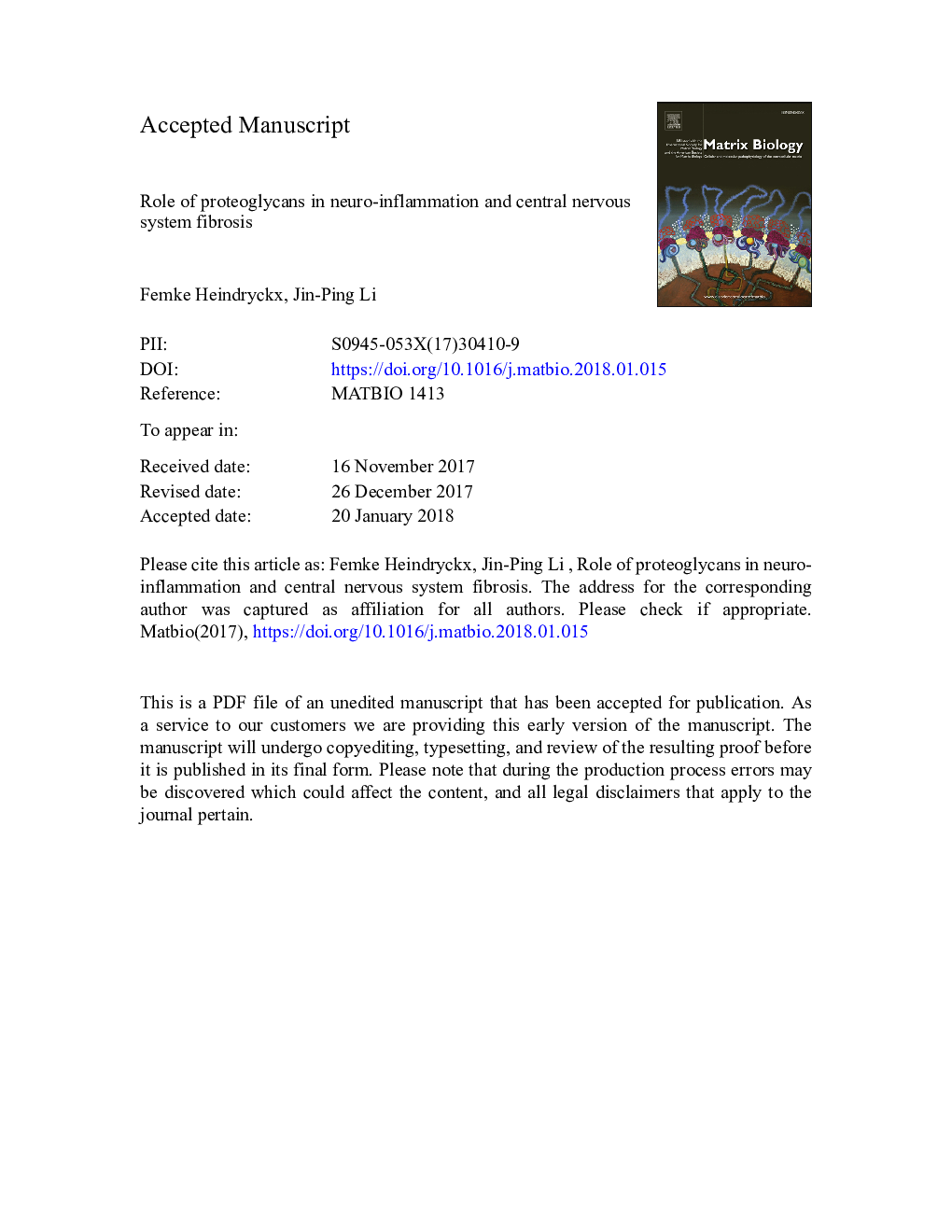| کد مقاله | کد نشریه | سال انتشار | مقاله انگلیسی | نسخه تمام متن |
|---|---|---|---|---|
| 8455054 | 1547994 | 2018 | 41 صفحه PDF | دانلود رایگان |
عنوان انگلیسی مقاله ISI
Role of proteoglycans in neuro-inflammation and central nervous system fibrosis
ترجمه فارسی عنوان
نقش پروتئول کلین ها در التهاب عصبی و فیبروز سیستم عصبی مرکزی
دانلود مقاله + سفارش ترجمه
دانلود مقاله ISI انگلیسی
رایگان برای ایرانیان
کلمات کلیدی
ECMAβPPCSPGGAGTGFEAECTGFproteoglycansFGFHSPGTMEAβcathDKSPGGFAPexperimental autoimmune encephalomyelitis - آنسفالومیلیت خودایمنی تجربیNeuro-inflammation - التهاب عصبیamyloid beta - بتا آمیلوئیدCho - برایAlzheimer's disease - بیماری آلزایمرNeurodegenerative diseases - بیماری های نوروژنیکParkinson's disease - بیماری پارکینسونtransforming growth factor - تبدیل فاکتور رشدChinese Hamster Ovary - تخمدان هامستر چینیCNS - دستگاه عصبی مرکزیBBB - سد خونی مغزیcentral nervous system - سیستم عصبی مرکزیfibroblast growth factor - فاکتور رشد فیبروبلاستFibrosis - فیبروز یا فساد الیافkeratan sulfate proteoglycan - قلمه های سولفات پروتئگلیکانExtracellular matrix - ماتریکس خارج سلولیBlood-brain barrier - مانع خون مغزیMultiple sclerosis - مولتیپل اسکلروزیس(ام اس)wild type - نوع وحشیHeparan sulfate - هپاران سولفاتHeparan sulfate proteoglycan - هپارین سولفات پروتئگلیکانGlial fibrillary acidic protein - پروتئین اسیدی فیبریلاسیون گلایالamyloid-β precursor protein - پروتئین پیش ماده آمیلئید βcathepsin D - کاتهپسین DChondroitin sulfate - کندرویتین سولفاتchondroitinase ABC - کندریتیناز ABCGliosis - گلیوزGlycosaminoglycan - گلیکوزآمینوگلیکان
موضوعات مرتبط
علوم زیستی و بیوفناوری
بیوشیمی، ژنتیک و زیست شناسی مولکولی
تحقیقات سرطان
چکیده انگلیسی
Fibrosis is defined as the thickening and scarring of connective tissue, usually as a consequence of tissue damage. The central nervous system (CNS) is special in the sense that fibrogenic cells are restricted to vascular and meningeal areas. Inflammation and the disruption of the blood-brain barrier can lead to the infiltration of fibroblasts and trigger fibrotic response. While the initial function of the fibrotic tissue is to restore the blood-brain barrier and to limit the site of injury, it also demolishes the structure of extracellular matrix and impedes the healing process by producing inhibitory molecules and forming a physical and biochemical barrier that prevents axon regeneration. As a major constituent in the extracellular matrix, proteoglycans participate in the neuro-inflammation, modulating the fibrotic process. In this review, we will discuss the pathophysiology of fibrosis during acute injuries of the CNS, as well as during chronic neurodegenerative conditions such as Alzheimer's disease, Parkinson's disease, multiple sclerosis and age-related neurodegeneration with focus on the functional roles of proteoglycans.
ناشر
Database: Elsevier - ScienceDirect (ساینس دایرکت)
Journal: Matrix Biology - Volumes 68â69, August 2018, Pages 589-601
Journal: Matrix Biology - Volumes 68â69, August 2018, Pages 589-601
نویسندگان
Femke Heindryckx, Jin-Ping Li,
